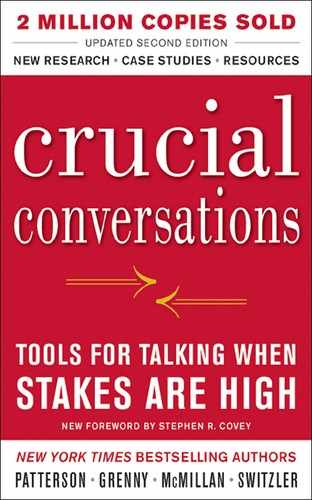AL
I’ve said for years that Crucial Conversations skills are only applicable if you live or work with or near other people. That’s a broad statement that applies equally to me. During these last ten years, I have had my share of challenges, a few failures, and a number of successes—and from all of these, I’ve learned a thing or two. I’m going to share a few incidents that happened and the lessons that I learned.
1. I have been to the airport hundreds of times. On one particular day, I went to the airport to pick up my wife. I had the perfect plan to pay nothing for parking, and if everything worked, I would be in and out of the parking lot in fewer than thirty minutes. I arrived according to plan; I met and hugged Linda; I got her luggage in my truck, and sped to the exit. I knew I was under thirty minutes. Then the parking attendant said, “Three dollars.” I asked to see my ticket and it read “29 minutes.” I noted again and again that it should be free. My wife was now discreetly elbowing me. I asked to talk to the manager, who said his computer was accurate and the ticket was wrong. I wasn’t very nice. I paid the three dollars and left.
Lesson: We teach that “when it matters most, we often do our worst.” I’ve learned that sometimes when it hardly matters at all, we can do our worst. There is no cruise control for the conversations, and we need to be alert all the time. I have practiced noticing my early warning signs, and I’ve learned that I can catch problems with myself early.
2. Over the years, I’ve found certain categories of crucial conversations to be especially tough for me. One of those is this: “How do I speak up when I think someone is consistently ungrateful?” I’ve ruminated and been irritated. I’ve avoided the person. I’ve tried mastering my story with “Why would a reasonable, rational, decent person act that way?” At first, I couldn’t find a solution, so I remained bothered. I couldn’t speak up. But I had it all wrong. I should have been asking myself, “What do I really want?” By asking that question, I found that I was helping to help, not to be thanked. The emotions went away.
Lesson: We have to find and ask the right question to get the right solution.
3. A few years ago a lady came up after a keynote and asked me to sign her book. This was the most underlined, tabbed, and dog-eared book I had ever seen, and as I signed it, I commented that the book looked well used. She agreed that she had used it, and, at my prodding, she told me about bringing up issues with her brother-in-law, with her boss, and with other departments where she worked. This was great. I said, “You’ve shared so many great stories, I’m not sure what your position in the company is—Head of HR, COO?” She looked at me as though I didn’t get it, and then she said nicely, “You don’t get it. I work in IT. Position doesn’t matter. Crucial conversations belong to the first person to see them. I don’t solve the issues; I just make sure they are brought up in a safe way.”
Lesson: There are a lot of people who are teaching me new lessons about crucial conversations.
